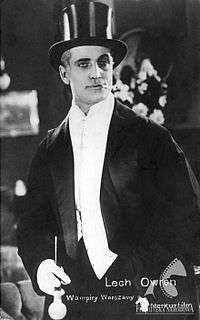Lech Owron
Lech Owron (6 July 1893 – 9 June 1965) was a Polish stage and film actor whose career began in the 1920s during the silent film era.[1]
Lech Owron | |
|---|---|
 | |
| Born | 6 July 1893 |
| Died | 9 June 1965 (aged 71) |
| Other names | Lech Owron-Przyłuski |
| Occupation | Actor |
| Years active | 1925–1960 |
Early life
Born in Radom, Lech Owron graduated from the Edward Rontaler Gymnasium in Warsaw, he then studied mining engineering in Mons, Belgium. During the outbreak of World War I, he was in Russia and returned to Poland in 1919 where he became the director of the newly formed Quid Pro Quo Theater in Warsaw. He also worked as bank clerk in the early 1920s.[2]
Acting career
Owron began his career in film with the role of the villainous Baron Kamiłow in the Wiktor Biegański directed 1925 crime drama Vampires of Warsaw. The film was a financial and critical success in Poland. However, Owron soon found himself typecast within the film industry and for a number of years many of his film roles were that of villains and scoundrels.[3]
He worked steadily through the late 1920s and early 1930s in film, but soon found himself discouraged by the roles he was receiving. One of his more successful roles of the era was the 1926 Biegański directed comedy drama Orlę (English release title: The Little Eagle), in which he played the role of the brigand Janosik; a Robin Hood-like character of the Tatra Mountains.[4]
Following a small role in the 1933 Mieczysław Krawicz directed drama Szpieg w masce (English release title: Spy), he temporarily retired from film and began to concentrate on roles on the stage. He returned to the screen in two films in 1937 before once again retiring.[5]
Following the end of World War II, Owron returned to the stage sporadically with various theater engagements. He made one final film in 1960, Krzyżacy (Knights of the Teutonic Order), directed by Aleksander Ford before permanently retiring from acting altogether. He died in Katowice in 1965.[6]
Filmography
| Year | Title | Role | Notes |
|---|---|---|---|
| 1925 | Vampires of Warsaw | Baron Kamiłow | |
| 1926 | Czerwony błazen | Prosecutor Gliński | |
| 1927 | Orlę | Janosik | |
| 1927 | Bunt krwi i żelaza | Journalist Ryszard Wertczyński | |
| 1928 | Ludzie dzisiejsi | Herbutt, manager | |
| 1928 | Romans panny Opolskiej | ||
| 1929 | 9:25. Przygoda jednej nocy | ||
| 1929 | Mocny człowiek | Actor | |
| 1929 | Z dnia na dzień | Sędzia Wojskowy | |
| 1929 | Szlakiem hańby | Artur Klug | |
| 1930 | Dusze w niewoli | Witold Kaniewski | |
| 1930 | Niebezpieczny romans | A Detective | |
| 1931 | Cham | Chauffeur | |
| 1932 | Szyb L-23 | ||
| 1932 | Rok 1914 | ||
| 1932 | Rycerze mroku | ||
| 1933 | Ostatnia eskapada | ||
| 1933 | Szpieg w masce | Man talking to Skalski | |
| 1937 | O czym marzą kobiety | Croupier | |
| 1937 | Pan redaktor szaleje | ||
| 1937 | Dorożkarz nr 13 | Croupier | |
| 1960 | Knights of the Teutonic Order | Castle Ccommander | (final film role) |
References
- Filmpolski.pl in Polish; accessed 8 November 2015.
- Filmpolski.pl in Polish; accessed 8 November 2015.
- Filmpolski.pl in Polish; accessed 8 November 2015.
- Charles Ford, Robert Hammond: Polish Film: A Twentieth Century History. McFarland, 2005. pp. 34-35; ISBN 978-1-476-60803-7
- Filmpolski.pl in Polish; accessed 8 November 2015.
- Charles Ford, Robert Hammond: Polish Film: A Twentieth Century History. McFarland, 2005. p. 39. ISBN 978-1-476-60803-7